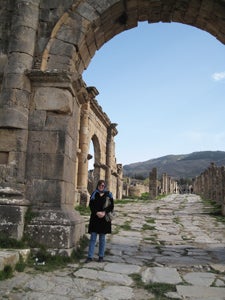Laurie Brand Selected as Bellagio Center Resident
Laurie Brand, Robert Grandford Wright Professor and professor of international relations in USC Dornsife, has won a Rockefeller Foundation Bellagio Center residency award to finish her project, Restor(y)ing the State: National Narratives and Regime Resilience in the Arab World.
The four-week residency that begins Oct. 25, 2012 will give Brand room-and-board and work space at the Bellagio, Italy, center. It will provide her the opportunity to participate in informal presentations of residents’ works and engage in discussions within and across disciplines. She will meet a diverse group of residents who are scholars, artists, policymakers and practitioners.
“Having twice before been at the Rockefeller Center for short conferences, I know what an exciting place it is intellectually,” Brand said. “I am now looking forward to this longer-term residency and the time for quiet reflection and intensive writing it will offer as I think through the broader implications of this project.”

Laurie Brand stands at the site of the ruins of the Roman city of Cuicul in Eastern Algeria. This World Heritage Site, known today as Djemila, meaning beautiful in Arabic, is one example of the rich and varied cultural heritage of this North Africa country which celebrates the 50th anniversary of its independence this summer. Photo courtesy of Laurie Brand.
The fellowship will enable Brand to write the conclusions for a book she began as a Carnegie Scholar. In 2009, she traveled to Jordan where she launched her project, a comparative study of Jordan, Algeria and Egypt with a particular focus on the role of educational materials in constructing post-independence state narratives. She completed the research for the Algeria case study in March 2011, and for Jordan during the past Winter semester break. She will be working intensively over the summer with the material from her Egypt research so that by October 2012, she will be ready to write the conclusions while in Bellagio.
Brand, a four-time Fulbright Scholar and a past director of the School of International Relations in USC Dornsife, hopes the book will convey to an American audience the complexities of national narrative and identity construction in the Middle East and North Africa.
Focusing on the presentation of founding myths and the purported components of national unity, she explains in her book how regimes have manipulated successive versions of the narrative — particularly in their schools’ curricula — in response to some of the most serious political, economic and socio-cultural crises of the post-independence period.
One clear example was Egyptian President Anwar Sadat’s increasing focus on non-Arab aspects of Egypt’s identity — its Pharaonic past and its membership in the Muslim world — as part of his strategy to reinforce his position in contradistinction to his predecessor, the Arab nationalist icon Gamal Abdel Nasser.
Brand’s study will conclude with explorations of the kinds of changes one may expect in formulations of national identity in countries currently undergoing political transitions as part of the region-wide uprisings.